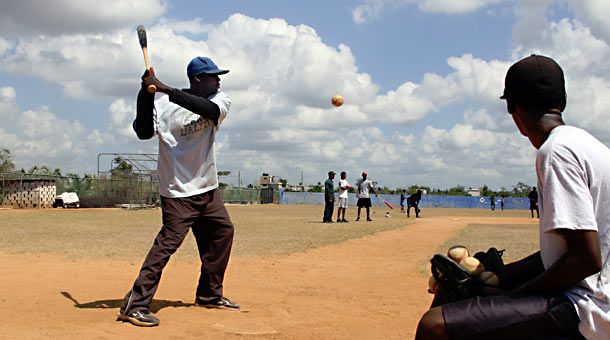
Pelotero does a good job of showing the entire situation in a believable way and doesn’t fall prey to sensationalism.

Pelotero does a good job of showing the entire situation in a believable way and doesn’t fall prey to sensationalism.
As someone who has played some variation of baseball since the age of 6, and as someone who has compiled a single home run in their 20 year long career, I feel uniquely qualified to handle a review of Ballplayer: Pelotero; the independently produced documentary about the Major League Baseball’s farm system in the island nation of the Dominican Republic. Director/producer trio Ross Finkel, Trevor Martin, and Jonathan Paley met some resistance from the MLB due to some unsavory portrayals of MLB affiliated scouts and organizations in the Dominican Republic. A documentary that has the MLB’s knickers in a twist? Count me in.
It’s not a great wonder why the MLB paused at this movie. The version of the game the MLB tries to sell everyone is the “Good ole’ boys of summer.” We go bananas over stat crunching in baseball so much so, it has spawned professions like “Sabermetricians” who break down players according to easy to understand stats like Value Over Replacement Player, Ultimate Zone Rating, and Player Empirical Comparison and Optimization Test Algorithm. We love it so much, we tend to glaze over the fact that a lot of our international players get dehumanized in the process. This documentary shows the shady underside of baseball’s international involvement through the eyes of two young Dominican prospects; Miguel Angel Sanó who was arguably the best prospect of that year by a considerable amount, and Jean Carlos Batista, a upper-middle of the pack player who tends to overestimate his ability. Pelotero shows the MLB engaged in a harsh cutthroat game of Dominican Roulette where players are treated as commodities and nobody even bothers to stay hush-hush about it. Multiple times from multiple levels during Pelotero, the interviewee tells the camera straight out that these players are nothing more than dollar signs. All at the ages of 15 and 16! When tough questions are posed, trainers, scouts and facility directors unabashedly tell the interviewer that these players are regarded, and treated like capital. It really sets the mood for the unethical behavior on display from some of the scouts and directors.

Because Pelotero is a documentary, it has a different set of criteria upon which to judge it by. A good documentary should tell a story, keep interest, and leave the viewer with a sense of emotional involvement. Pelotero does all three of those things and more. For one, the story of Miguel Sanó was national headlines in the baseball world a few years back. This movie shows you the inner workings of the drama that unfolded due to Miguel Sanó’s age dispute. It really sheds a bad light on the MLB in this regard and the scouts and directors handling the situation come off as corrupt.
Some documentaries have to fabricate or edit the story to make someone a bad guy but Pelotero does a good job of showing the entire situation in a believable way and doesn’t fall prey to sensationalism, albeit, only through the eyes of Miguel Sanó’s family and agent. Jean Batista’s story also lends itself to some tense moments although I was a bit less emotionally invested in his story. Pelotero plays out like a movie in that it has a concise beginning, middle, and end. There is a sense of resolve that the documentary supplies that leaves the viewer satisfied instead of saying, “Wait, tell me more!” Comparisons to Bully come to mind in that regard.
Music also plays a big part in this documentary. The Dominican Republic has a culture of music that is lively and fast and Pelotero smoothly uses these music bits to add a great depth to simple scenes like 16 year olds shagging pop flies. Pelotero also has great cinematography and directing. There are some beautiful shots through withered wrought iron gates and dramatic close ups of the stars’ faces which could only happen if the director was adept at his job. Anytime a camera is around a self aware 15 year old, it’s a bit more difficult to film intense questions like, “What happens if you fail?” The emotion comes through strong.
Pelotero‘s directors, writers and cameramen allow the viewer to receive a slice of the Dominican Republic in only a way experienced filmmakers could do. John Leguizamo’s narration also provides an excellent voice over to scenes that aren’t just white on black text. Overall, Pelotero left me with a better understanding and appreciation for where these Dominican and other international players come from and entertained me in the process.